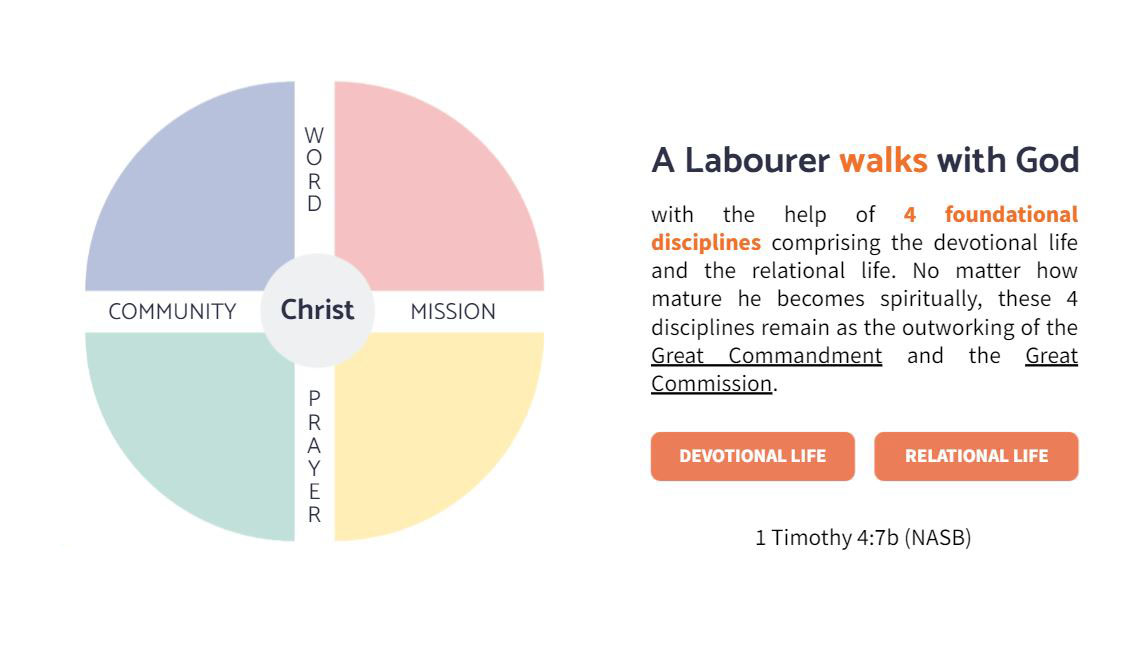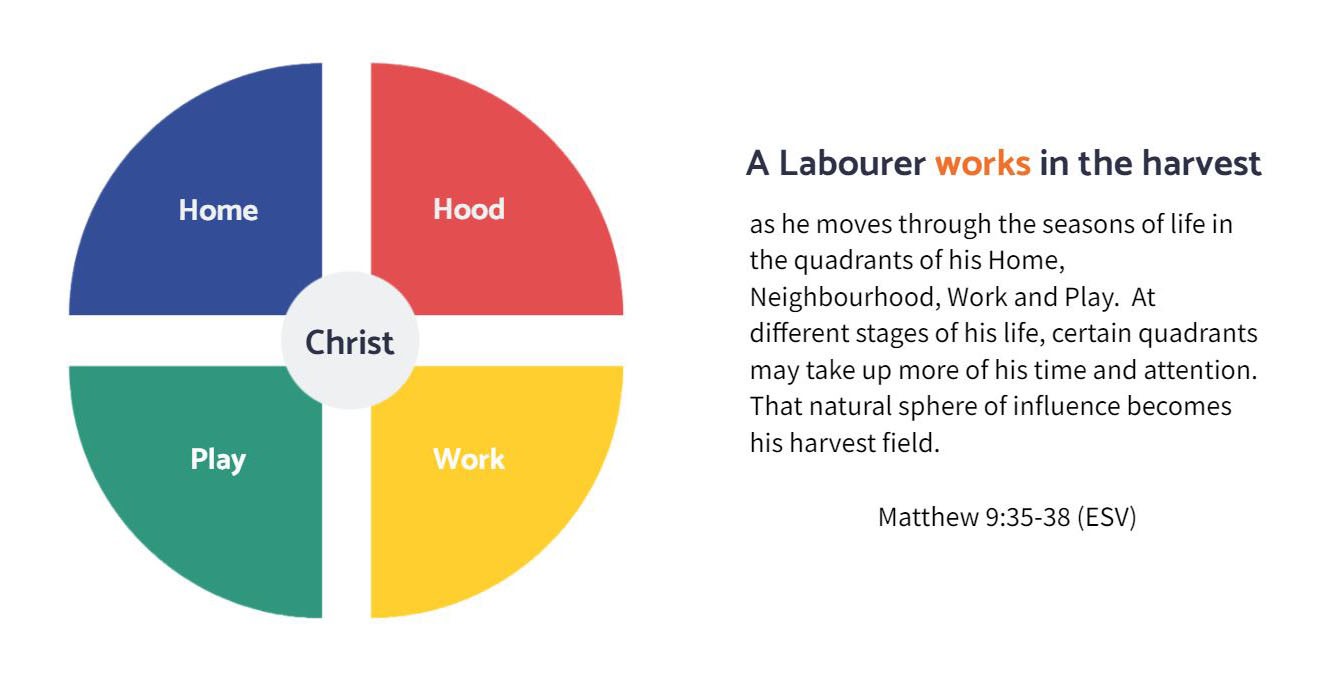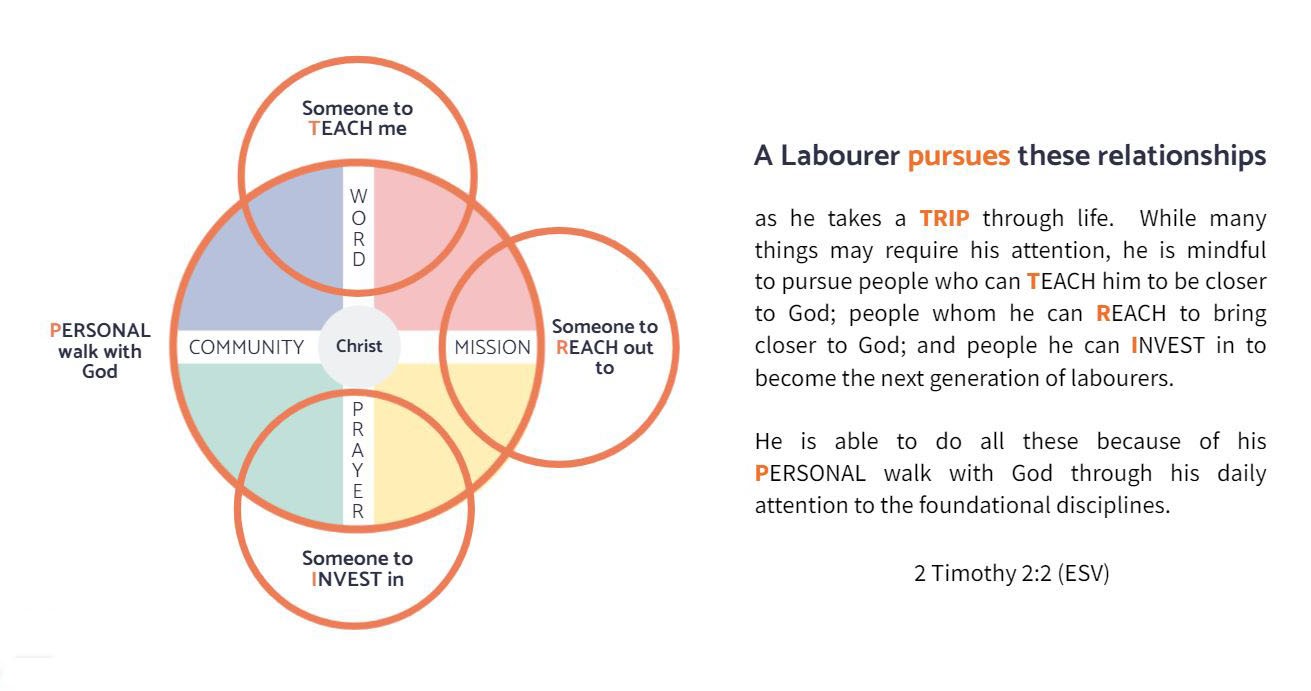Raising Lifelong Labourers through Disciplemaking Communities (DMCs)
Disciplemaking Communities (DMCs)
Jesus Christ summed up the commands given to the nation of Israel in two commandments in Mark 12:30-31 (ESV).
The first was
"Hear, O Israel: The Lord our God, the Lord is one. And you shall love the Lord your God with all your heart and with all your soul and with all your mind and with all your strength" (v.30),
and the second was
"You shall love your neighbor as yourself" (v.31).
These are often jointly referred to as the Great Commandment. To the covenantal community that was the nation of Israel through which nations were to be blessed, absolute devotion to God was the centre from which communal ties were to radiate.
As Christ, the fulfilment of the old covenant, and head of the body of believers whom he was calling to himself in a new covenant, Jesus extended the first and the second commandments into a new commandment of which he is the centre.
In John 13:34-35 (ESV), Jesus said to his disciples,
“A new commandment I give to you, that you love one another: just as I have loved you, you also are to love one another.”
Jesus is the initiator of love. As he has loved his disciples, they were also to love one another.
This new community bound in love with Christ as the centre had one more distinctive. In addition to a new commandment, they were given a new commission. Mathew 28:18-20 (ESV) records that
“Jesus came and said to them, ‘All authority in heaven and on earth has been given to me. Go therefore and make disciples of all nations, baptizing them in the name of the Father and of the Son and of the Holy Spirit, teaching them to observe all that I have commanded you. And behold, I am with you always, to the end of the age.'"
They were to be disciplemaking communities centred in Christ.
Lifelong Labourers
These disciplemaking communities were not to exist for and within themselves. They were asked to GO. Go where? It was recorded in Matthew 9:35-36 that Jesus went throughout all the cities and villages proclaiming the gospel of the kingdom, healing those in pain and teaching. He likened the crowds he met to sheep without a shepherd. Jesus then used the analogy of the harvest in Matthew 9:37 (ESV) —
“The harvest is plentiful, but the laborers are few; therefore pray earnestly to the Lord of the harvest to send out laborers into his harvest.”
Labourers are needed to work in the fields of the harassed and helpless crowds who are like sheep who do not know their shepherd. The harvest is not for a single season; it is a harvest until Jesus’ second coming. For this, we need lifelong labourers, and generations of lifelong labourers.
Lifelong labourers are ordinary people who are growing in their intimacy with Jesus and who are working in the harvest (living and discipling among the lost) with a generational mindset.
In short, a lifelong labourer walks with God, works in His harvest, and pursues discipling relationships.
Lifelong Labouring Framework
The characteristics of a Lifelong Labourer
The characteristics of a Lifelong Labourer are expressed through
1) four foundational disciplines;
2) four quadrants of harvest fields; and
3) four key relationships.
1. Four Foundational Disciplines
A labourer walks with God with the help of 4 foundational disciplines comprising the devotional and relational life. No matter how mature he becomes spiritually, these 4 disciplines remain as the outworking of the Great Commandment and the Great Commission.
The devotional life is our walk with God through His Word at work in us and our communion with Him through prayer. The relational life is the expression of the gospel of Christ in our relationships as we participate in our communities of relationships, carrying out the mission of Christ’s good news.
Through the exercise of these disciplines as our expression of our love for God, we allow the Holy Spirit to transform us towards godliness (1 Timothy 4:7b).
Figure 1: 4 Foundational Disciplines [adapted from The Wheel Illustration (1976), The Navigators]

2. Four Quadrants of Harvest Fields
A labourer works in the harvest as he moves through seasons of life in the quadrants of his Home, Neighbourhood, Work and Play.
At different stages of his life, certain quadrants may take up more of his time and attention. For instance, a young graduate starting work may spend more of his time at work and in his place of play (e.g. gym, running club). On the other hand, another who is married with a young family may spend more of his time at his place of work and at home.
At each stage of life, the harvest field will revolve around these four quadrants and this helps him to identify who his ‘neighbours’ are so that he can make time to love them as Jesus did. Hence, the natural sphere of influence at each different stage of life becomes his harvest field (Matthew 9:35-38).
Figure 2: 4 Quadrants of Harvest Fields

3. Four Key Relationships (TRIP)
A labourer pursues these discipling relationships as he takes a TRIP through life. While many things may require his attention, he is mindful to pursue people who TEACH him to be closer to God; people whom he can REACH to bring closer to God; and people he can INVEST in to become the next generation of labourers. He is able to do all of these because of his PERSONAL walk with God through his daily attention to the foundational disciplines (2 Timothy 2:2).
These relationships are important to help him keep focus as he orientates his life around obedience to the Great Commission.
Figure 3: 4 Key Relationships (TRIP)

Disciplemaking Community (DMC) Framework
The work of advancing the gospel of Jesus and His Kingdom started with a community. Before being taken up to heaven, Acts 1:2-4 tells us that Jesus instructed His chosen apostles and entrusted them with the work of gospel advancement together as a community.
For anyone to labour through different life stages, it is important that he does so together with other like-minded disciples in a Disciplemaking Community (DMC). Why specifically a DMC?
1. Shared environment
It is important for disciples to be in an environment where disciplemaking culture is emphasised upon and lived out. It is tough to be labouring on our own without the support of other disciples doing likewise. In this environment, disciples share a life of accountability with one another for their own spiritual growth and involvement in the mission of Christ (Acts 2:42-47).
2. Spiritual and relational intimacy
We all crave intimacy. This may often be lost in a large community or local church as relationships can be more distant and therefore, have less opportunities for depth. This is reportedly so among younger people who are leaving traditional church structures as they experience little intimacy whilst attending many church programmes. At the same time, they long for a gospel-encompassing community which has deep interaction and care that comes with open communication that Acts 2:42 calls koinonia (Greek).
Furthermore, the traditional structures and programmes make it hard for them to reach out and invite others in. Hence, this can cause the community to miss out on the missional element of being a disciple of Christ (Acts 2:47).
3. Penetrating into the harvests
Through the DMC, believers can organise themselves according to their interest group (e.g. gym or exercise groups), geographical group (e.g. work or home location), professional group (e.g. IT or medical profession) etc. This way, believers can organise themselves to reach out to any unreached people group through natural spheres of contact, hence, widening the scope of outreach (Matthew 9:37-38).
4. Opportunities for everyone to serve
A DMC is small enough for each member to exercise their spiritual gifts to serve one another. In a large congregation, it is very often likened to a soccer game with 22 players desperately needing rest in front of 40,000 others who desperately need exercise! This is common in large communities where few people do the work while others remain as spectators (Romans 12, 1 Corinthians 12, Ephesians 4).
In summary, a disciplemaking community is a group of disciples coming together regularly to encourage each other to grow in their personal relationship with God through the practice of foundational disciplines. Additionally, they seek to reach the lost through the different seasons of their lives while investing in others through various discipling relationships.
The ABCD Characteristics of a Disciplemaking Community (DMC)
As these disciples live out the above, each DMC will be characterised by 4 intentional trajectories of growth in the areas of being Alongside for accountability, Bridging the sacred-secular divide, Caring for one another and Developing one another as disciples of Christ and disciplemakers for His harvest.
Figure 4: Characteristics of DMCs (ABCD)
Alongside for accountability — Someone to journey with through stages of life. As we journey alongside one another, we develop close accountability for our spiritual growth and involvement in the mission of Christ (Hebrews 10:24-25).
Bridging the sacred-secular divide — Recognising that all spheres of life are spiritual, hence it is lived out as “a spiritual act of worship” to God (Romans 12:1-2). This is expressed through our abilities to articulate our faith verbally or through our lifestyle that demonstrates the core of the gospel living in and through us.
Develop — Where the disciples in the community “intentionally strengthen each other’s capacity to grow and contribute.” [Adapted from Lead, Develop, Care (2021)]. 2
Cities are places of constant rapid change and development. City life is filled with complexities and perplexities as people collide outside of traditional norms and spaces. We need a God-inspired, city-oriented strategy that will help us effectively relate the gospel to the urban man within the setting of disciplemaking communities where believers are discipled and challenged towards fulfilling the mandate of the Great Commandment and Commission.
With the vision of raising lifelong labourers in disciplemaking communities to advance the gospel of Jesus and His kingdom, the City Discipling Network developed the DMC Framework and L3 Framework to help disciples of Jesus keep it simple to keep it going.
1 https://www.worldbank.org/en/topic/urbandevelopment/overview
2 Cook, Terry (2021). Lead Develop Care: Shaping a Different Kind of Leader. Charlottesville: LDN Publishing




